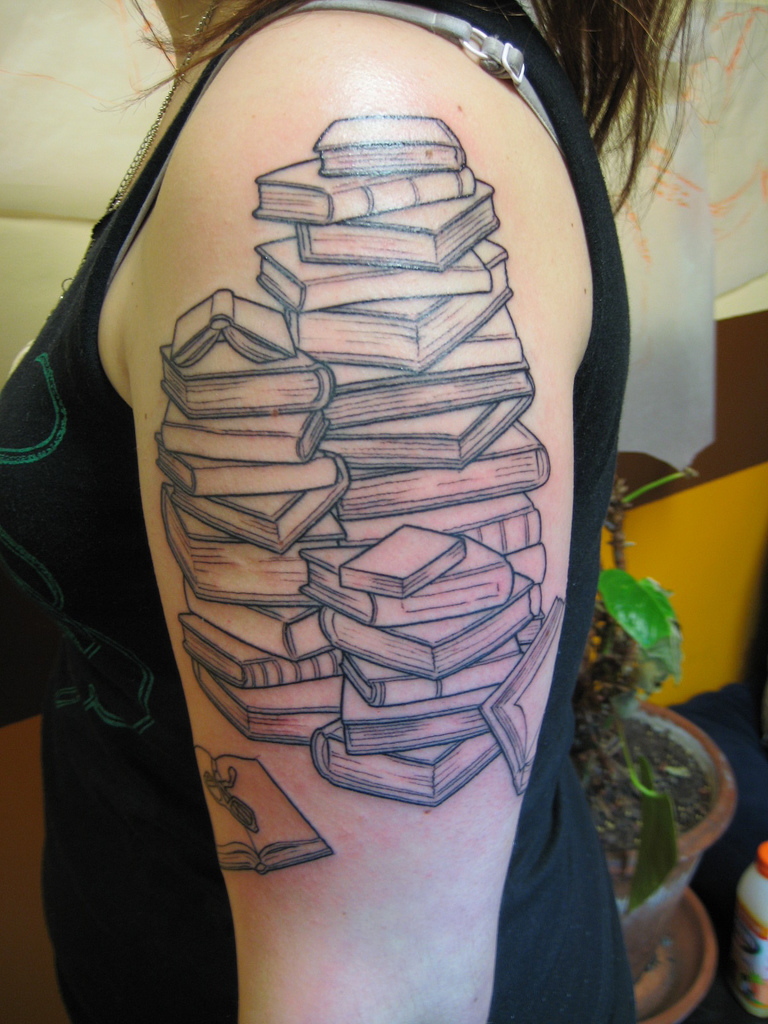
I love books, maybe not as much as the young woman shown here, but I could definitely see myself with a minute bookshelf of my favorites, tattooed above my shoulder blade. That’s how much I esteem books.
So it pisses me off whenever I hear about another book being banned-and I’m not talking about banned books in Iraq or North Korea, I’m talking about banned books here, in the U.S.A.
Steinbeck’s “The Grapes of Wrath,” was also temporarily banned in California in 1939, for its allegedly unflattering portrayal of the Monterey/Salinas area.The Supreme Court overturned the prohibitions on these and other books since then.
Their view is that they have ‘removed’ books, not ‘banned.’ It’s an ongoing debate based on perspective.
Arizona Superintendent of Public Instruction, J. Huppenthal, declared the MAS program illegal last year under a new state law banning “racially-divisive classes.” He determined that Tucson’s Mexican-American studies program violated a state law, a law that he helped write, that bans courses that “encourage resentment toward a race or class of people,” and are designed primarily for one ethnic group.
The organization Librotraficante (Book Traffic) is diligently working to overturn Arizona’s removal (banning) the MAS texts from classrooms. Their by-line:
Vote to Restore the American Dream in Arizona. A Great Nation Does not Fear Kids Reading Books.
Families in a 38-year-old segregation lawsuit against Tucson Unified School District are asking a federal judge to reinstate the school district’s recently suspended Mexican-American studies classes, arguing that they are critical to ending discrimination for students. A U.S. District Court judge has overseen the settlement between the school district and the families, which included the creation of an African-American studies program and then Mexican-American studies in 1997.
Danger does not arise from viewpoints other than our own; the danger lies in allowing others to decide for us and our communities which reading materials are appropriate! (Roberta Stevens, Pres. American Library Assoc.)
 |
| abffe.org |
In support of the right to choose books freely for ourselves, the American Library Association co-sponsors Banned Books Week (its inception was 1982), an annual celebration of our right to access books without censorship. The ALA and several other associations such as American Booksellers sponsor the event.
For 2012 the week is September 30-October 6. “It is the one time during the year that booksellers and librarians can talk to their customers about the hundreds of book challenges that occur in schools and libraries around the country every year.
In 2010, the American Library Association counted 348 challenges. The most frequently challenged title? And Tango Makes Three, a children’s picture book that tells the true story of two male penguins that adopt an abandoned egg.”
American Booksellers Foundation for Free Expression will help booksellers make videos of people reading from banned books and post them online. Last year, ABFFE promoted the Internet read-out to booksellers, who produced more than 90 videos. Altogether they and others posted more than 800 videos of people reading from banned books on YouTube, which, ABFFE said, “helped attract unprecedented press attention to Banned Books Week.” Details are available at abffe.org.
So, in praise of books and a big Bronx Cheer to the threat to our 1st Amendment rights and the ability to make a choice in what books we can read, I offer this chingon poem from a Chingona Poet, that I read on La Bloga.


Reblogged this on johncoyote and commented:
Freedom to read. Something we must stand strong for.
LikeLike
Thank you for your amazing blog.
LikeLike
Thank you for reading and your kind words, John. It’s an honor to have this post reblogged to your readers.
LikeLiked by 1 person
Most important rights are. “Freedom of speech.”
LikeLike
I too love books and don’t agree with banning or burning books but this issue is about white supremacy, really, isn’t it?
LikeLike
I don’t know if I agree, Writersdream9, with saying it’s about white supremacy. I would agree that it is a reflection of a state of mind which believes ‘they’ know better what I can, or you can, or our children can read. It takes away choice.
LikeLiked by 1 person
You may be right!. Sometimes I read things into things. Basically, I guess i’d jst say “power over, instead of power with” Thanks again, dear heart!
LikeLike